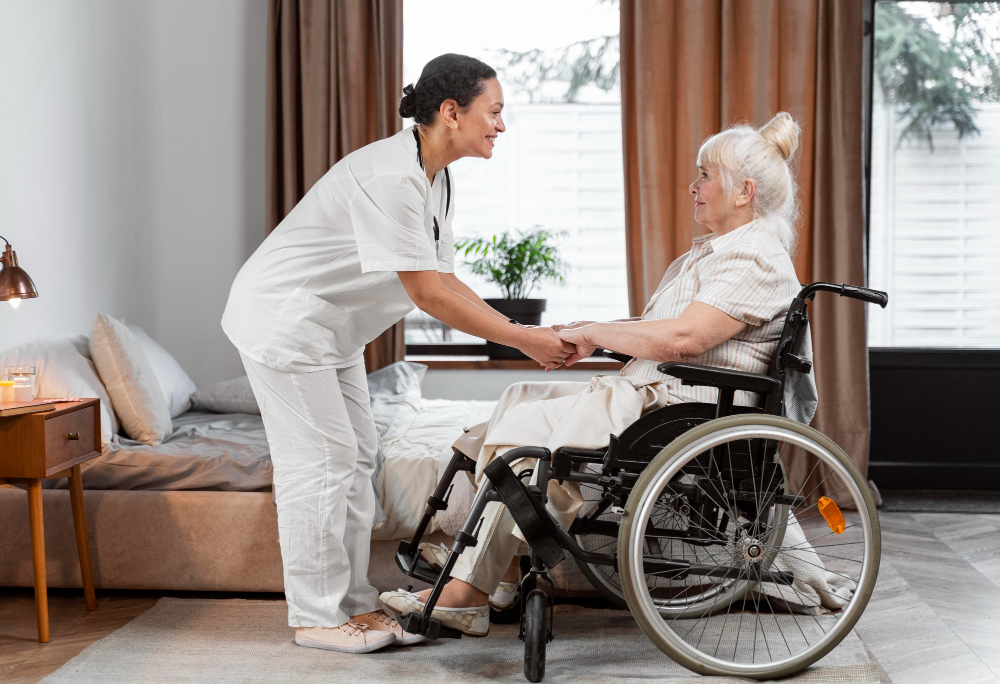
Individuals aged 60 and above face an increased risk of developing Parkinson's disease, a chronic condition impacting the nervous system, particularly motor functions such as movement
Parkinson's manifests with a variety of symptoms, including:
Tremors
Muscle rigidity
Difficulty in walking
Coordination problems
Sluggish movement
Reduced facial expressions
Speech difficulties
Dizziness, fatigue, and restlessness
Memory issues and cognitive difficulties
Sleep disturbances
Though Parkinson's cannot be cured, effectively managing its symptoms is paramount. This necessitates adherence to medical guidance and the maintenance of overall well-being.
Today, we delve into how caregivers play a pivotal role in the care of senior loved ones suffering from Parkinson's disease
Coping with Parkinson's presents unique challenges for seniors, as symptoms manifest and progress differently in each individual. Engaging the services of a professional caregiver from a reputable elder care service provider in Kolkata can yield substantial benefits.
Elderly Care
Caring for seniors becomes even more critical when they are vulnerable to conditions like Parkinson's. Their needs may evolve, and the presence of a caregiver can significantly enhance their quality of life.
Daily Challenges
Parkinson's disease presents daily challenges, including difficulties with mobility that can impede simple tasks such as dressing and eating. Caregivers provide crucial support to help seniors maintain their daily routines. Caregivers offer essential assistance with activities of daily living, such as bathing, dressing, and eating.
Medication Management
Managing Parkinson's often involves a complex medication regimen. Caregivers play a crucial role in ensuring seniors adhere to their medication schedules, take medications as prescribed, and report any side effects to healthcare professionals.
Meal Planning
Parkinson's can affect swallowing and eating habits. Caregivers help prepare meals that are easy to eat and tailored to dietary requirements, ensuring seniors receive proper nutrition.
Fall Prevention
Since mobility issues are a common symptom of Parkinson's, the risk of falls is heightened. Caregivers offer physical support, and stability, and create a safe living environment to minimize the risk of accidents.
Emotional Support
Coping with a chronic illness can affect one's emotional well-being. Caregivers offer companionship and a listening ear, aiding seniors in addressing the emotional aspects of living with Parkinson's. Moreover, caregivers engage seniors in social activities, hobbies, and outings, enhancing their overall well-being.
Physiotherapy Assistance
Many seniors with Parkinson's benefit from physiotherapy. Caregivers can assist with prescribed exercises, ensuring seniors follow their recommended routines for physical therapy. Elder Care Service providers provide physiotherapy services in the comfort of home to help senior loved ones feel stress-free and comfortable while availing of physiotherapy services.
Constant Monitoring
Caregivers closely monitor seniors' health, noting any changes in symptoms or overall condition. This information is invaluable for healthcare professionals in adjusting treatment plans accordingly. A structured daily routine can greatly benefit individuals with Parkinson's. Caregivers establish routines encompassing medication schedules, exercise, meals, and rest, promoting stability and comfort.
Customized Care
Recognizing that each senior's experience with Parkinson's is unique, caregivers tailor their approach to individual needs and preferences, ensuring personalized and effective care.
Communication Support
As Parkinson's can affect speech and communication, caregivers assist seniors in expressing themselves effectively, reducing frustration and facilitating social interactions.
Creating a Safe Environment Caregivers make necessary adjustments to the living space to prevent accidents, such as installing handrails, decluttering, and improving lighting.
Transportation
Caregivers accompany seniors to medical appointments, therapy sessions, and other essential outings, ensuring seniors receive the necessary care and support beyond the home environment.
Professional caregiver for seniors living with Parkinson's disease can significantly enhance their quality of life. Caregivers provide indispensable assistance, and emotional support, and cultivate an environment that fosters safety, well-being, and engagement. While Parkinson's cannot be cured, compassionate care plays a pivotal role in helping seniors manage their symptoms, ultimately leading to an improved quality of life.